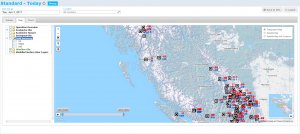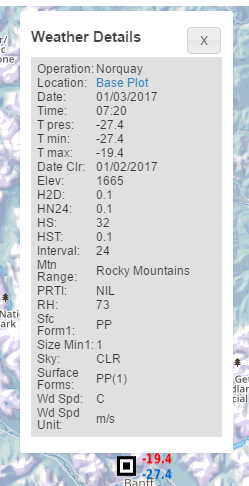Difference between revisions of "Map view layer: Weather observations"
Jump to navigation
Jump to search
(→Layout) |
(→Layout) |
||
| Line 7: | Line 7: | ||
==Layout== | ==Layout== | ||
| − | [[File:ReportMapLayersWx.png|300px|thumb|right|Fig. 1: | + | [[File:ReportMapLayersWx.png|300px|thumb|right|Fig. 1: Weather site layers of map view of InfoEx report.]] |
| + | [[File:ReportMapLayersWxDetail.png|300px|thumb|right|Fig. 2: Detail of weather observation shown in map view of InfoEx report.]] | ||
The weather sites map layer shows the point locations of all the weather observations included in the current report (Fig. 1). | The weather sites map layer shows the point locations of all the weather observations included in the current report (Fig. 1). | ||
Revision as of 12:41, 2 January 2014
| REQUIREMENTS | |
| Permission | All users |
| Connectivity | Online only |
This document describes the functionality of the Weather Sites layer of the Map view of the InfoEx report.
The goal of the Weather Sites map layer is to provide users with a spatial overview of all the weather observations submitted to the InfoEx in the time period of the current report.
Layout
The weather sites map layer shows the point locations of all the weather observations included in the current report (Fig. 1).
The currently supported weather parameters are (Fig. 2):
| Name | White label | Name of weather site. |
| Elevation | White label | Elevation of weather site. |
| Tmin | Blue label | Lowest minimum temperature recorded at weather sites by this operation during the time period of report. |
| Tmax | Red label | Highest maximum temperature recorded at weather sites by this operation during the time period of report. |
Functionality
- Click on a main trigger type in the layer hierarchy panel to directly zoom the map to the area that has avalanche observations of the particular trigger type.
- Click on the check box next to the main trigger types in the layer hierarchy panel to show/hide the avalanche observations of the particular trigger type.
- Click on the icon of an individual avalanche observation to view its complete record in a pop-up balloon (Fig. 2). The pop-up balloon contains all of the information that was submitted for the observation including links to any associated attachments.
Related documents
- Operation overview
- Avalanche observations
- Avalanche hazard
- Snow Profiles
- Field summary
- Weather observations
- Time slider (used for all map layers)
- Additional external information sources
Functionality tested by
- Jan. 2, 2014: Pascal Haegeli

